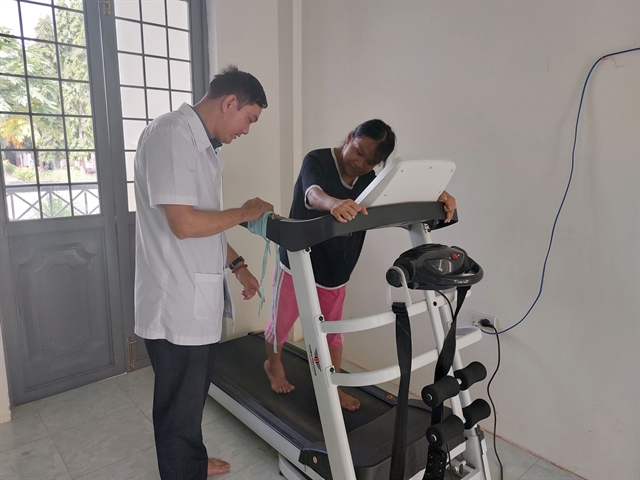 Society
Society

 |
| A Kon Tum Provincial Social Work and Protection Centre staff member assists a child with disabilities at a rehabilitation care. VNA/VNS Photo Khoa Chương |
HÀ NỘI — Professional social work is an inevitable requirement for the country’s development as a stable, sustainable and equal society, according to experts at the 14th Eurasia Forum of Social Workers held in Hà Nội on Tuesday.
The event was held at the Việt Nam Women’s Academy on World Social Work Day, the third Tuesday of March every year and falls on March 21 this year.
Việt Nam’s Social Work Day is celebrated on March 25.
The forum gathers representatives of social work associations and experts from 11 countries, including Russia, India, South Korea, and the Philippines, for discussions on new models, initiatives and good case practices in the field.
Tôn Ngọc Hạnh, vice president of Việt Nam Women’s Union, said: “The world is witnessing major changes in the socio-political situation and the post-COVID era.
“This requires all of us to strive further and join hands in actions for people, especially the vulnerable and disadvantaged groups.”
An overview of social work as a profession in the country by Dr Nguyễn Hải Hữu, Vice President of Việt Nam Association for Vocational Education and Training & Social Work, revealed that there are currently about 235,000 social workers nationwide.
Among them, approximately 35,000 work at social services facilities, nearly 100,000 in associations, and over 100,000 others are coordinators working for poverty reduction, child protection and fighting social evils.
According to the statistics, there is one professional or semi-professional social worker for every 425 people in the country.
A study jointly conducted by the University of Social Sciences and Humanities (under Việt Nam National University - Hanoi) and the Việt Nam Women’s Academy shows that many people in the country are aware of their right to social security, especially in terms of employment support.
Among the 2,100 survey respondents, 66.3 per cent know about the right to borrow money at preferential interest rates for product development; while 68.8 per cent are aware of their right to extend the loan repayment period for production development loans; and 54 per cent know they have the right to assist the construction of barns, the improvement of aquaculture ponds and production land.
In this aspect, social workers assist with policy advocacy and consultation and prepare documents and link support resources for the individuals.
 |
| Social work experts at the conference on Tuesday. — VNS Photo Nhật Hồng |
{ "id": "Bh7qfw3sf4", "type": "myToolImages", "data": { "data": "" } }
However, the study pointed out that there are still limitations in terms of capacity and service delivery in the field that need to be addressed.
“The core goal of social work activities in supporting jobs for people is to realise basic human rights, ensure equity and social progress, and promote economic growth and sustainable development of the country,” said Assoc. Prof Nguyễn Thị Kim Hoa, representative of the research team.
Other social work experts also shared case studies from their respective countries, such as social welfare policies for the disabled in South Korea, preventive intervention programmes for children in conflict with the law in the Philippines, and competency development for social workers in Russia.
President of the International Federation of Social Workers Joachim Mumba said: “We need to act together to ensure that social protection moves from being reactive public spending to being a public investment in the wellbeing of the people.
“We need to engage our governments to realise their duties and responsibilities in taking care of vulnerable people, as well as working together with social workers to provide support.
“Social workers should join and invest in strategies to support communities to be better prepared for future crises.” — VNS